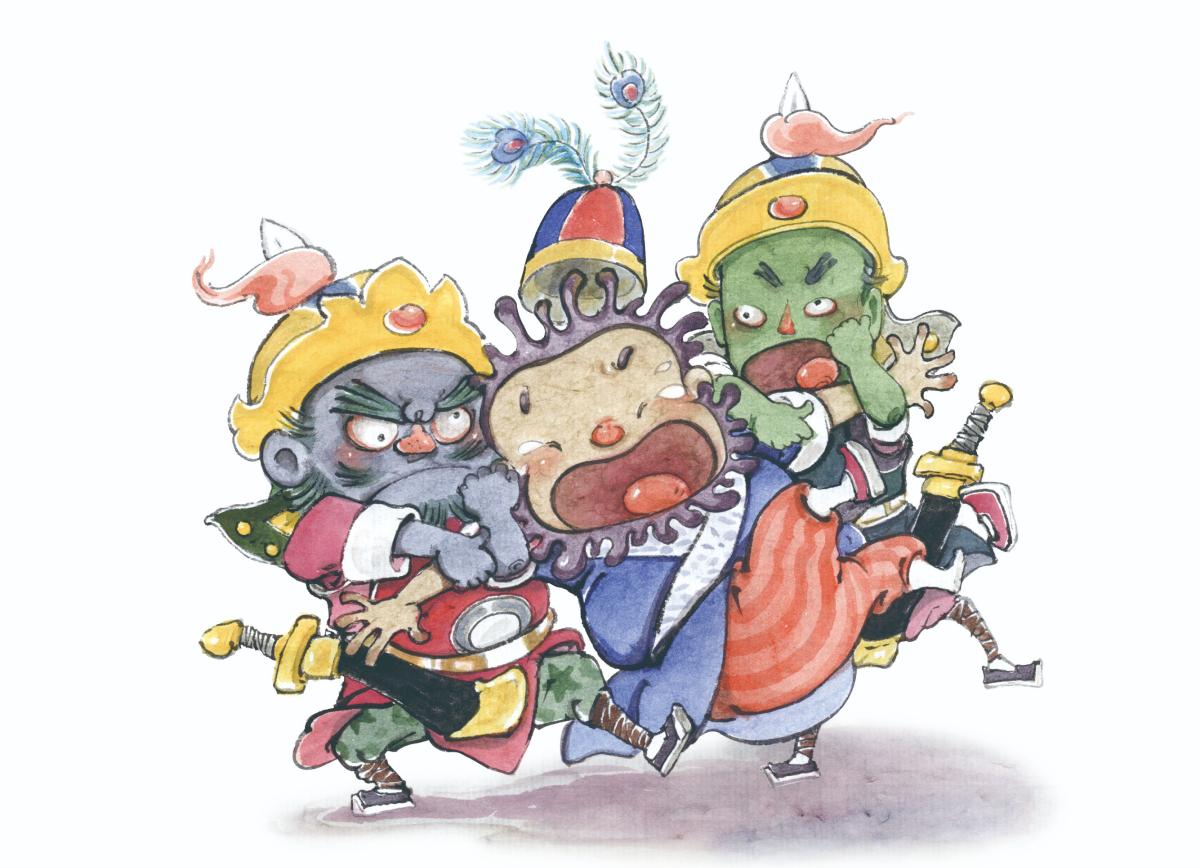Special Topics
How Can Gold Turn Out to Be a Poisonous Snake?
 In Buddhist scriptures, we can see how the Buddha repeatedly warned his disciples that "money is just like a poisonous snake." But, how does money transform into a venomous serpent?
In Buddhist scriptures, we can see how the Buddha repeatedly warned his disciples that "money is just like a poisonous snake." But, how does money transform into a venomous serpent?On a sunny, windy morning, the Buddha and Ananda walked along a country road of Shravasti. As they moved along, a gleaming object on the roadside caught their attention. The Buddha exclaimed, "Ananda! Look, there is a poisonous snake." Ananda concurred, "Yes, it is indeed a venomous snake."
Meanwhile, a farmer toiling in the field overheard their conversation, and wondered, "Where is the snake?" Driven by curiosity, he approached the spot and was delighted by what he found: "These monks are talking nonsense about a poisonous snake. This is gold, of invaluable worth!" With no one in sight, the farmer took the gold.
The originally impoverished farmer now leads a lavish and ostentatious lifestyle, attracting great attention from others. The news of the farmer gaining wealth overnight soon traveled to the king. Suspecting the farmer of acquiring the wealth unlawfully, the king ordered the farmer's arrest and interrogated him using torture. While confined in jail, the farmer felt remorse and cried out, "Oh World-Honored One! Oh Ananda! This is indeed a poisonous snake!" Confused by his words, the jailer reported the matter to the king, who then instructed the jailer to bring the farmer to the palace for an explanation.
After recounting how he gained possession of the gold, the farmer sighed deeply. "It is my confusion at that moment that is to blame. My greedy thought led me to such an end. No wonder the Buddha and Ananda
The "Poor Rich:" King Pasenadi and Mahānāma
What defines poverty? Is it living hand-to-mouth, or possessing nothing but bare walls at home? How about those who are greedy and stingy? In Buddhism, there were two instances of the "poor rich" — that is, people possessing wealth without knowing how to use it wisely. One of them was even dubbed as "the poorest person in Shravasti" by Surata (善順菩薩).
One morning, as Surata made his rounds in Shravasti, he called out: "Who is the poorest person in Shravasti? I have a precious bell for them!" Upon hearing his call, townspeople flocked to claim the title. However, Surata declined each of them, saying, "None of you are the poorest in town. There is a man who is actually the poorest of the poor." This led everyone to wonder, "Who could it be?"
Surata responded with a smile: "It is your King, Pasenadi." This declaration caused uproar among the crowd, who then challenged him by saying, "He is the king of a country who never lacks money, jewelry, and all the precious and rare stuff. How can he be the poorest?"
"To an insatiable person, possessing heaps of gold and silver as high as mountains is like the sea swallowing rivers, never feeling satisfied. This is poverty in its truest sense." After his explanation, Surata led the crowd to the royal palace to see for themselves. As expected, King Pasenadi was in the middle of leading 500 people to meticulously assess the assets he had in the treasury.
Seeing this, Surata said to the king, "I have a precious bell of invaluable worth that I intend to give to the poorest person in Shravasti. Since Your Majesty must be the best candidate, please accept it." Having heard this, the king flushed with shame, but still retorted, "Do you have any evidence to prove your words to be true?"
At this moment, the Buddha and Bodhisattvas arrived. Knowing the king's temperament, rather than bluntly criticizing him, the Buddha tactfully told him, "On one hand, Your Majesty is wealthy indeed, while Surata is poor; however, on the other hand, Surata is rich, while Your Majesty is poor." So, why did the Buddha say that?
"In terms of worldly fortune, Your Majesty holds high social standing and enormous power, and never lacks seven kinds of treasure, including gold, silver, precious red coral, or amber jewels. In this sense, Your Majesty is rich while Surata is poor. Nonetheless, in terms of diligently practicing virtuous conducts, observing precepts, learning Buddhadharma, refraining from self-indulgence, and inexhaustibly propagating the Dharma to deliver all beings, Surata is rich while Your Majesty is poor. Moreover, Surata's wealth is firm and pure. Even with all of the fortune in the Kosala Kingdom put together, it is far less than one millionth of his wealth."
After hearing the Buddha's words, King Pasenadi felt deeply ashamed. He turned to Surata with joined palms, prostrated, and said, "You're absolutely right. This throne can arguably be the source of all forms of suffering, keeping me away from virtuous practices, while increasing my afflictions." The king then divided the assets in the royal treasury into three portions, dedicating one to the Three Jewels, and another to the poor and disadvantaged, while retaining the rest as national property. Through this act, he prayed that all sentient beings attain peace and happiness, as well as liberation from samsaric bondage.
In comparison to King Pasenadi's exploitative and greedy manner, the other "poor rich" was the Scrooge-like Mahānāma.
Legend has it that one day, around noon, King Pasenadi hurried to Jetavana to pay his respect to the Buddha and seek Dharma guidance. The Buddha greeted him, saying, "Your Majesty, it is already noon. How's your morning going?"
 "World-Honored One, the affluent gentry, Mahānāma, has passed away. As none of his heirs had laid claim to his legacy, I went early this morning to take it over, and didn't finish until just now." King Pasenadi raised his voice and said, "World-Honored One, allow me to share with you. Despite Mahānāma's wealth, he ate spoiled porridge with impurities, and wore coarse-burlap clothing. For traveling, he took a dilapidated vehicle with a canopy made of twigs and tree leaves."
"World-Honored One, the affluent gentry, Mahānāma, has passed away. As none of his heirs had laid claim to his legacy, I went early this morning to take it over, and didn't finish until just now." King Pasenadi raised his voice and said, "World-Honored One, allow me to share with you. Despite Mahānāma's wealth, he ate spoiled porridge with impurities, and wore coarse-burlap clothing. For traveling, he took a dilapidated vehicle with a canopy made of twigs and tree leaves.""Being long acquainted to him, I have never seen him making offerings to shramanas (spiritual practitioners) and Brahmins, nor did he ever help the poor and disadvantaged. And he always had meals alone, behind closed doors." Having finished talking, King Pasenadi could not help but shake his head and sigh.
"Your Majesty! Someone like him, no matter how affluent they are, can merely be a miserable person. Those who possess great fortune but fail to use it wisely cannot bear to spend a penny on either themselves or their families, let alone show consideration for their servants, or cultivate their fields of merit by making offerings to śramaṇas and Brahmins. Even if they try to safeguard their fortune throughout their life, their wealth will end up being either expropriated by the king, or left in the hands of thieves. It may also be destroyed in a fire or a flood, or taken by heirs they dislike."
The Buddha went on to use an analogy to illustrate that failing to use our wealth wisely is like a pond with sweet and pure water located in an inaccessible place. Since no one has ever tasted it, the water will eventually dry up. Despite its sweetness, the water is of no use. "Therefore, Your Majesty, wealth should be used wisely, to benefit ourselves, our family, servants, and the people around us. Meanwhile, we should also cultivate our fields of merit by making donations and offerings. This way, our wealth won't turn into nothing in the end, being wasted."
A choice of wisdom: Lakshmi or Alakshmi
Would you decline the fortune that arrives at your doorstep? In the Mahāyāna Mahāparinirvāṇa Sūtra, the Buddha shared a story about making a wise choice. A good-looking lady in fancy clothing knocked on a householder's door. The householder answered the door, and inquired her name and origin. The lady replied, "I'm Lakshmi (Gunamahadevi, Goddess of Merit). Wherever I go, there will be fortune, jewels, and joy!" Delighted on hearing that and believing the fortune was smiling at him, the household quickly welcomed Lakshmi in, and made offerings and prostrated to her, anticipating good fortune to come.
Before long another person came knocking on the door. Again, the householder opened the door, sticking out his head, only to see an ugly, greasy, and disheveled woman dressed in ragged clothes. He frowned and inquired, "Who are you, and what brings you here?"
The woman replied, "My name is Alakshmi (Goddess of Misfortune)." The householder asked, "Why are you called this name?" She replied in a gloomy tone: "Wherever I go, households go bankrupt and fall into decay." On hearing this, the householder's face darkened. He immediately brandished an edge tool, threatening her to leave, "Get lost, cursed one! Do not even think about entering my house!" Alakshmi chuckled, "What a fool you are! The classy lady in your house is my older sister. Driving me away would be driving her away as well!" Sensing the sinister omen, the householder immediately went inside and asked Lakshmi, "There is an unsightly woman outside claiming to be your younger sister, Alakshmi. Is this true?"
"She is indeed my younger sister." Lakshmi confirmed, "We are inseparable. Wherever I go, she follows. Wherever we travel, I do good deeds, and she does evil. While I bring benefits to people, she only causes disasters. Accept her if you want me to stay. While worshiping me, you shall respect her as well." Astonished by this, the householder decided to send Lakshmi out, declaring, "If good and evil must come together, I will keep neither of you. So please leave now, both of you!" Seeing the sisters gradually go far away, the householder finally heaved a sigh of relief.
After being driven away, Lakshmi and Alakshmi then came to the door of a poor family individually. Rejoicing at their presence, the family immediately invited them to enter the house. Lakshmi wondered why and asked, "Seeing our presence, people always can't wait to drive us away. Why do you dare to host us?" The poor person replied, "Because I’ve long been poor, wondering when I could finally enjoy prosperity and wealth. Now I am so happy with your coming to visit. Even if your younger sister may cause trouble, I will still be more than happy to keep you here."
If you were this poor person, would you let them stay? Through this story, the Buddha pointed out that sentient beings in the world are attached to appearances of existence due to a deluded and hindered mind. Those lacking in wisdom adore Lakshmi while fearing Alakshmi. In fact, despite the stark contrast in their appearances, the sisters share the same essence—where there is arising, there is perishing; where there is good, there is evil; where there is wealth, there is poverty; where there is abundance, there is scarcity; and where there is gain, there is loss. People of true wisdom will not be concerned about whether it is Lakshmi or Alakshmi. Only by transcending dualism can we attain great ease and freedom.
Related articles:
Buddhist Perspectives on Wealth
The Financial Quotient of Buddhism
How Can Gold Turn Out to Be a Poisonous Snake?
The Guardian Deities of Wealth Revered in Buddhism
Commonly Asked Questions about the Buddhist Perspective on Wealth
Resource: Issue 394 of Humanity Magazine, Dharma Drum Publishing Corporation
Translation: Sinag-ling Li (李祥苓)
Editing: Keith Brown, Chia-Cheng Chang (張家誠)
